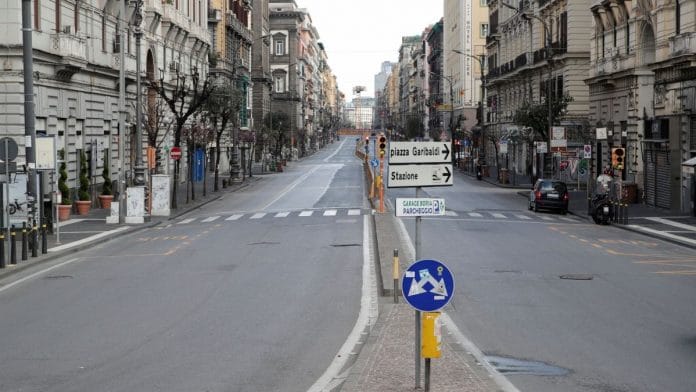New Delhi: Last night Prime Minister Narendra Modi called for a ‘Janata Curfew’ this Sunday, asking citizens to stay indoors and suggesting that India may need to be prepared for such measures in the forthcoming weeks in the wake of the global coronavirus pandemic.
While India is shutting down for just a day, the worst affected countries have imposed longer lockdowns to prevent the spread of the virus.
After the novel coronavirus broke out in Wuhan, China, authorities initiated a stringent lockdown on 23 January in the city. While the measures were seen as extreme, they effectively helped curb the spread of disease.
On Thursday, for the first time in three months, China reported no new cases of COVID-19 infection. The success in China has led other countries to follow suit.
In India, Kalaburagi district in Karnataka became the first to be locked down after a 76-year-old man died of COVID-19. The man was a popular Qazi (magistrate or judge under Sharia law) in the area and had met several people just before his death. Over 640 people in the area are under strict quarantine, and Section 133 (conditional order for removal of nuisance) and 144 (unlawful assembly) of the CrPC (Code for Criminal Procedure) have been imposed in the area.
While no case of community transmission has been identified yet, the PM’s address on Thursday indicates that the country may need to be prepared for lockdowns.
Here is a look at what lockdowns have meant in other countries.
Also read: Moving towards darkest hour of coronavirus, India can take strength from WW2’s Dunkirk moment
China
In Wuhan, the government employed a “closed-off management” which included issuing millions of licenses for personal travel within China, some of which had the slogan, “It is everyone’s responsibility to fight the virus”.
For over six weeks, authorities put restrictions on local travel and food deliveries, screened vehicles, and tested body temperatures at the community entrance and exits.
In many cities, workers were organised on a vast scale to deliver food to homes. Residents were allowed to shop only if they had a permit and shops were open only at limited times.
While most of these restrictions are now being lifted, there are other measures — such as not allowing more than four people to get into an elevator — that are still in place.
Italy
Italy is the worst affected country — with the number of deaths from coronavirus now surpassing that of China. On 8 March, Italy shut down the northern region of the country, which had been severely affected. The restrictions were then extended to the entire country two days later.
Movements of a population of 60 million is severely restricted. People can travel only for “urgent, verifiable work situations and emergencies or health reasons”.
Those infected with COVID-19 must not leave their homes for any reason, while those with symptoms have been asked to stay at home and limit social contact.
Public and private companies have been urged to put their staff on leave, while schools and universities are closed, and all exams have been cancelled. Supermarkets and pharmacies remain open. Ceremonies such as marriages, baptisms and funerals are banned.
All gatherings “in public places” have been banned. Museums and cultural venues are closed, along with nightclubs, cinemas, theatres and casinos. Swimming pools, spas, sports halls and ski resorts across the country are shut.
France
On March 17, French President Emmanuel Macron announced the country’s toughest restrictions on public life outside of wartime.
Cafés, bars, restaurants and non-essential shops had been ordered to close last Saturday before Macron’s announcement Monday, which are in place for at least the next two weeks.
Police officers would be deployed to enforce the lockdown, with checkpoints set up nationwide. People can be stopped outside their homes and asked to justify the reason for stepping out by filling out a legal document.
The document requires French residents to declare that they have stepped outside for a ‘permissible reason’, which includes activities like walking the dog and “brief individual exercise, excluding team sports”.
Anyone flouting the restrictions will have to pay a fine of €38 to €135.
Spain
After Italy, Spain is the second-worst affected country in Europe, with over 830 deaths so far. After reporting over 1500 fresh coronavirus cases on a single day, the country’s government announced a complete lockdown on 14 March.
People are allowed to leave their homes only to buy food and medicine, commute to work, go to medical centers and banks, or take trips related to the care of the elderly, the young, and dependents.
All restaurants, bars, hotels, schools and universities nationwide have been closed.
The government also has the power to take control of private hospitals if the public health service is overwhelmed. Local authorities have also devised a plan to convert hotels into temporary wards to care for less critical patients.
The US
Areas in California are in partial lockdown after six deaths were reported in the region.
All non-essential businesses — such as bars and gyms — are closed. However, grocery stores, pharmacies, restaurants serving takeout, and gas stations remain open.
Non-essential gatherings and travel is prohibited.
Essential travel includes going to the grocery store, accessing healthcare or going to provide aid to family or friends. While airports, taxis and public transit will continue running, those using any mode of travel are expected to practice social distancing.
Also read: India’s COVID-19 fight needs a new social and economic behaviour. It’s easier said than done






